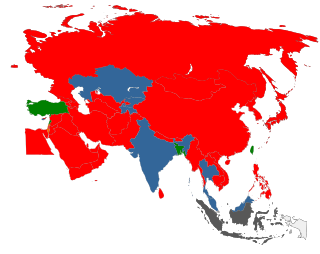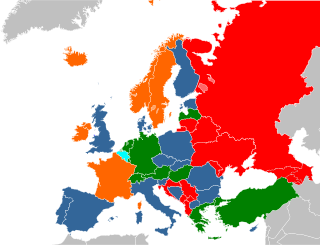Related Research Articles
Prostitution in Russia is illegal. The punishment for engagement in prostitution is a fine from 1500 up to 2000 rubles. Moreover, organizing prostitution is punishable by a prison term. Prostitution remains a very serious social issue in Russia.

In Great Britain, the act of engaging in sex as part of an exchange of various sexual services for money is legal, but a number of related activities, including soliciting in a public place, kerb crawling, owning or managing a brothel, pimping and pandering, are illegal. In Northern Ireland, which previously had similar laws, paying for sex became illegal from 1 June 2015.

The legality of prostitution in Asia varies by country. There is often a significant difference in Asia between prostitution laws and the practice of prostitution. In 2011, the Asian Commission on AIDS estimated there were 10 million sex workers in Asia and 75 million male customers.
Forced prostitution, also known as involuntary prostitution or compulsory prostitution, is prostitution or sexual slavery that takes place as a result of coercion by a third party. The terms "forced prostitution" or "enforced prostitution" appear in international and humanitarian conventions, such as the Rome Statute of the International Criminal Court, but have been inconsistently applied. "Forced prostitution" refers to conditions of control over a person who is coerced by another to engage in sexual activity.
Prostitution in South Africa is illegal for both buying and selling sex, as well as related activities such as brothel keeping and pimping. However, it remains widespread. Law enforcement is poor.
Prostitution in Chile is legal, subject to regulation, but related activities such as keeping brothels and pimping are prohibited. Several hundred women were registered as prostitutes with the National Health Service.
Prostitution in Argentina is legal under Federal law. Article 19 of the constitution states: "The private actions of people that do not offend in any way the public order and morality, nor damage a third person, are only reserved to God, and are exempt from the authority of the magistrates." Organised prostitution is illegal. In addition, individual provinces may place further restriction on the trade. For example, in San Juan, publicly offering sex services for money is punishable by up to 20 days in jail. In 2012, newspapers were banned from carrying classified-ads offering sexual services. UNAIDS estimated there to be about 75,000 prostitutes in the country in 2016.

Prostitution in Pakistan is a taboo culture of sex-trade that exists as an open secret but illegal. Prostitution is largely based in organisational setups like brothels or furthered by individual call girls.

Prostitution is legal and regulated in Bangladesh. Prostitutes must register and state an affidavit stating that they are entering prostitution of their own free choice and that they are unable to find any other work. Bangladeshi prostitutes often suffer poor social conditions and are frequently socially degraded.
Prostitution in Trinidad and Tobago is legal but related activities such as brothel keeping, soliciting and pimping are illegal.
Prostitution in Malaysia is restricted in all states despite it being widespread in the country. Related activities such as soliciting and brothels are illegal. In the two states of Terengganu and Kelantan, Muslims convicted of prostitution may be punishable with public caning.

The legality of prostitution in Europe varies by country.
Prostitution in Moldova is an illegal activity but is widespread and socially acceptable. UNAIDS estimate there to be 12,000 prostitutes in the country.
Prostitution in Suriname is illegal but widespread and the laws are rarely enforced. Human trafficking and Child prostitution are problems in the country. Prostitutes are known locally as "motyo". UNAIDS estimate there to be 2,228 prostitutes in the country.
Prostitution in Croatia is illegal but common. Forcible prostitution, any kind of brothels, or procuring are treated as a felony, while voluntary prostitution is considered to be infraction against public order. Like in many other Southeast European countries, the problem of human trafficking for the purposes of sex is big in Croatia.
Kazakhstan is a source, transit, and destination country for men, women, and children trafficked from Uzbekistan, Kyrgyzstan, Tajikistan, and Ukraine to Kazakhstan and on to Russia and the United Arab Emirates (U.A.E.) for purposes of sex slavery and forced labor in the construction and agricultural industries. Kazakhstani men and women are trafficked internally and to the U.A.E., Azerbaijan, Turkey, Israel, Greece, Russia, and Germany and the United States for purposes of forced labor and sexual exploitation.
Prostitution in Namibia is legal and a highly prevalent common practice. Related activities such as solicitation, procuring and being involved in the running of a brothel are illegal. A World Bank study estimated there were about 11,000 prostitutes in Namibia.
Human trafficking in the Ivory Coast refers to the practice of forced labour and commercial sexual exploitation which uses Côte d'Ivoire a source, transit, and destination country for women and children who are trafficked for these purposes. Trafficking within the country's borders is more prevalent, with victims primarily trafficked from the north of the country to the more economically prosperous south. Boys from Ghana, Mali, and Burkina Faso are subjected to forced labour in the agricultural sector, including on cocoa, coffee, pineapple, and rubber plantations; boys from Ghana are forced to labour in the mining sector; boys from Togo are forced to work in construction; and boys from Benin are forced to work in carpentry and construction. Girls recruited from Ghana, Togo, and Benin to work as domestic servants and street vendors often are subjected to conditions of forced labour. Women and girls are also recruited from Ghana and Nigeria to work as waitresses in restaurants and bars and are subsequently subjected to forced prostitution. Trafficked children often face harsh treatment and extreme working conditions.
Prostitution in Kyrgyzstan has been legal since 1998, but the operation of brothels, pimping, and recruiting persons into prostitution are illegal, with penalties of up to five years There are estimated to be 7,100 sex workers in the country. Prostitution occurs on the streets, in bars, hotels and brothels.
Prostitution in Tajikistan is legal, but related activities such as soliciting, procuring and brothel keeping are prohibited. Prostitution has increased within the country since the collapse of the Soviet Union. UNAIDS estimate there are 14,100 female sex workers in Tajikistan. Government official figures for 2015 were 1,777 prostitutes and 194 brothels. Prostitution occurs on the streets and in bars, restaurants, nightclubs and saunas, and HIV prevalence is 3.5% amongst sex workers.
References
- 1 2 3 "Country Report on Human Rights Practices in Kazakhstan". US Department of State. 11 March 2008. Retrieved 19 November 2017.
- 1 2 Aliya (28 August 2007). "Prostitution in Kazakhstan: abuse and risk". SWAN. Retrieved 20 November 2017.
- 1 2 3 Emrich-Bakenova, Saule (18 August 2016). "Kazakhstan: Sex Workers Call for Legalization of Prostitution". EurasiaNet. Retrieved 19 November 2017.
- 1 2 3 4 "Kazakhstan". Sexuality, Poverty and Law Programme. Retrieved 20 November 2017.
- ↑ "В Казахстане инвалиды борются за легализацию проституции". Новости (in Russian). 22 January 2009. Retrieved 19 November 2017.
- ↑ Каликулов, Динмухаммед (21 January 2009). "Казахстан: инвалиды просят денег для секса". BBC Russian (in Russian). Retrieved 19 November 2017.
- ↑ "Попрошаек и проституток начнут штрафовать в Казахстане". Tengri News (in Russian). 5 August 2014. Retrieved 19 November 2017.
- 1 2 Mavrich, Bret (4 July 2012). "City in Focus: Almaty, Kazakhstan". Exodus Cry. Retrieved 20 November 2017.
- ↑ "Легализация проституции в Казахстане". Zona (in Russian). 21 August 2006. Retrieved 19 November 2017.
- ↑ "В Казахстане снижается количество несовершеннолетних, задержанных за занятие проституцией". Nomad (in Russian). 13 December 2003. Retrieved 19 November 2017.
- ↑ "Kazakhstan". Trafficking in Persons Report 2008. U.S. Department of State (4 June 2008). This article incorporates text from this source, which is in the public domain.
- ↑ "Kazakhstan 2018 Trafficking in Persons Report". U.S. Department of State. Archived from the original on 29 July 2018. Retrieved 26 July 2018.